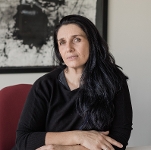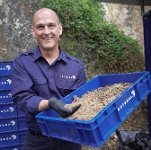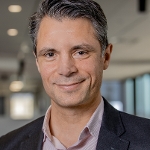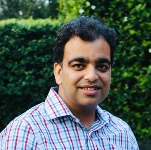
Australia's Ultimate Food Waste Solution
Goterra Pty Ltd
Registration closes in
A Scalable Solution to Australia's Waste Crisis
Automated Technology to Solve the Infrastructure Gap.
Food waste is a critical problem, with up to 90% ending up in landfills, driving 8% of global emissions.
Major metropolitan landfills will reach capacity by 2025, prompting governments to mandate waste diversion from 2026 onward. As capacity shrinks, disposal costs are rising sharply. Meanwhile, centralised alternatives like new landfills and anaerobic digestion facilities are too slow and expensive to meet the urgent demand, leaving a significant gap in viable infrastructure solutions.
Our technology harnesses the power of robotics and insects, using Black Soldier Fly larvae in automated Modular Infrastructure for Biological Services (MIBS) units deployed on-site or close to waste sources. These larvae consume twice their body weight daily, processing food organics and reducing emissions by up to 97% compared to landfill while creating two high-value products: insect protein for animal and aquaculture feed and premium frass fertiliser for agriculture.
With NSW's commercial food waste ban starting July 2026 and residential mandates by 2030, there simply isn't enough infrastructure available. Less than 10% of commercial organic waste currently meets new legislative requirements - creating a $3B+ opportunity in a $15B waste sector as over 90% must be diverted by 2030.
Want to know more? Watch the Investor Q&A here
From Australia to the World
A Global Crisis, A Scalable Solution
Food waste is a planet-wide opportunity. Globally, 1.05 billion tonnes of food waste is generated annually, with most buried in landfills producing 8% of global greenhouse gas emissions. Landfill capacity is declining worldwide while disposal costs rise sharply everywhere.
Regulatory Momentum Is Worldwide
The same regulatory shift transforming Australia is accelerating worldwide. The EU mandates 65% biodegradable waste reduction by 2035, and multiple nations have implemented or are implementing food waste bans. This creates urgent demand for Goterra’s infrastructure on a global scale.
Built for Global Deployment
Our technology is built to travel. Modular MIBS units are containerised for global shipping and deploy in months. Black Soldier Fly biology thrives across climates, while automated systems adapt to any regulatory environment. Five years of proven Australian operation has created battle-tested, export-ready infrastructure.
The Contamination Advantage Travels
Processing post-consumer waste in dense urban environments works everywhere. Our capabilities unlock the 90% of food waste that centralised solutions can’t handle, regardless of geography.
Local Proof for Global Scale
Australia validates the model; but every market faces the same crisis, creating a truly global opportunity for proven infrastructure.
Progress That Speaks Volumes
- Established commercial operations: 21 operational MIBS units across ACT, NSW, and VIC, solving the sustainability needs for over 45 pioneering customers, processing thousands of tonnes annually with proven reliability since 2020.
- Australian-first innovation: Only solution processing residential food waste in urban environments. City of Sydney facility servicing 22,500+ households processing 40 tonnes monthly.
- Backed by leading Australian venture capital: Investors include Tenacious Ventures, Rampersand, Giant Leap, Flying Fox Ventures, and Singaporean billionaire Michael Kum's M&L Investments. Strong investor support demonstrated through our $4.3M convertible note and $7.2M Series A1.
- Award-winning technology: Most Innovative Startup (2024), Smart50 Top 10 (2025) and Best Sustainability Startup (2024), Impact 100 Top 10 (Norrsken Foundation, 2025), Forbes Asia Top 100 to Watch, KPMG Tech Innovator Award. Founder Olympia Yarger named 2023 ACT Australian of the Year.
- Innovation partnerships: Research collaborations with CSIRO, End Food Waste Australia, ANU, University of Canberra, University of Queensland. Partnerships with leading waste Service Providers including: ORG, Bingo Industries. $17.9M total R&D tax incentives received.
- Contracted growth pipeline: $5M in contracted revenue across waste processing agreements, MIBS deployment, and offtake arrangements, with ~$2.9M committed demand awaiting capital deployment for activation.
Built for Scale and Impact
Our fully modular hub-and-spoke model deploys where customers need it, significantly reducing transport costs and emissions while creating value from waste streams that currently cost money to dispose of. We're the only Australian producer processing post-consumer organics at commercial scale with robotics and insects, enabling compliance with regulations competitors can't meet.
Four Revenue Streams: Waste processing fees competitively priced versus landfill alternatives with long-term take-or-pay contracts. MIBS lease fees for dedicated customer sites. High-value offtake sales: insect protein to aquaculture, poultry, and pet food markets (proven to increase yield, extend layer lifespan by six months, improve shell quality); frass fertiliser to agriculture and horticulture (improves soil structure, microbial activity, yields).
Network Effects Compound Value: Each MIBS unit acts as a processing node. Denser networks drive higher margins and lower per-unit costs. Geographic clustering strengthens competitive moat and operational leverage. 21 units creating Australia's first distributed organics processing network - positioning us to capture the infrastructure gap as regulatory pressure intensifies.
Scalable Technology: Modular MIBS design proven over five years. Standardised Australian manufacturing with Allied Engineering delivers four units every 17 days. Automated systems with integrated sensors optimise biological processing 24/7.
Customer Validation
What Our Partners Say
Melbourne Airport – Gigi Yuen, Head of Environment and Sustainability:
"Goterra is a science-driven, commercially viable enterprise that Australia should champion. Their technology is a mature, well-engineered solution based on robust biological science and modular manufacturing, delivering effective results in organic waste management. Goterra's infrastructure is operational, scalable, and already contributing to goals such as emissions reduction, waste circularity, and regional economic development."
Woolworths Group – Jasmine Medwell, Head of Planet:
"Working with Goterra has brought innovation to the way we manage non-edible food waste. Together we're forging new, scalable systems that help Woolworths recycle non-edible food waste and increase our circularity programs."
Hyatt Regency Sydney – Jane Lyons, General Manager:
"Goterra plays perfectly into Hyatt's World Of Care, Environmental, Social and Governance efforts. By adopting this innovative waste management system, we are reducing our environmental impact as well as supporting Hyatt's culinary ethos of 'Food. Thoughtfully Sourced. Carefully Served'."
$3B+ Market Opportunity
The Infrastructure Gap Is Widening
Australia generates 7.6 million tonnes of food waste annually. In NSW alone, over 550,000 tonnes of commercial food waste plus 1.5 million tonnes of residential organics must find compliant solutions by 2030.
Market Drivers Creating Urgency
Sydney will have no landfill capacity within five years - a potential $23 billion annual cost to NSW's economy. Commercial food waste bans from July 2026 create immediate demand, while residential organics (food and garden) mandates by 2030 expand the market exponentially. There is not enough infrastructure to process the mandated demand. Goterra is the fastest solution to solve this problem for customers and governments.
Traditional Solutions Can't Scale
Current technologies struggle in urban environments. Composting can't handle contaminated streams. Anaerobic digestion takes years to build and approve. Centralised facilities face development opposition and lengthy planning, driving them from waste sources.
Goterra's Advantage
Our decentralised hub-and-spoke model deploys in months, not years. On-site processing reduces transport costs and emissions. Modular units scale with demand. We process contaminated waste others reject. CSF and Series B funding will rapidly expand our network across NSW and ACT, plugging a massive gap competitors can't fill.
Why Invest Now
- Proven Technology: Five years of commercial operation with 21 units across three states. IP-protected automated systems processing 100+ tonnes weekly. First-in-world residential urban food waste solution.
- Blue-Chip Validation: Woolworths (partnership since 2020, dedicated 6,000-tonne facility), City of Sydney (22,500+ households, Australia's first municipality using insect processing), Lendlease / JLL Barangaroo, Hyatt Regency Sydney, Melbourne Airport, Coles, IGA. $5M in contracted revenue, and a further ~$2.9 committed revenue demonstrates compelling unit economics.
- Market Tailwinds: NSW landfill levies at $170.10/tonne and rising. 2026 commercial ban creates immediate demand. Infrastructure shortfall of ~2+ million tonnes processing capacity needed by 2030. Over 550,000 tonnes of commercial food waste in NSW alone seeking compliant solutions.
- Capital-Efficient Growth: Modular design enables SaaS-like scaling. Non-dilutive government support: $2.7M Industry Growth Program pending, $1.1M NSW Environmental Trust received, $17.9M total R&D tax incentives. Network effects improve margins with each deployment.
- Last Retail Opportunity: Our $25M Series B institutional raise is closing in early 2026. Once complete, Goterra exceeds CSF eligibility - closing retail access during this high growth phase of the company’s evolution. Invest alongside institutions at $52M pre-money valuation before national scale-up.
Investor Rewards
In addition to equity ownership, Goterra is offering three tiers of Investor Rewards that provide immediate benefits and a deeper engagement with our mission.
$5,000+ | Insider Access
Annual meeting / Q&A with Olympia and the leadership team. Get the story behind our mission, learn the science of what we're building, and hear what's next on our roadmap.
$10,000+ | Behind the Curtain
Annual meeting / Q&A with Olympia and the leadership team + experience our operation firsthand with access to a scheduled tour of one of our sites in NSW or the ACT. See the MIB units in action, understand the process from waste to resource, and discover why black soldier fly larvae are revolutionising how we think about sustainability.
$20,000+ | Legacy Maker
All other rewards, plus collaborate with us to name one of our new MIB units. Leave your mark on the future of waste transformation with a custom name that will live on our facility and in our story.
Always consider the general CSF risk-warning and offer document before investing
Please note: Investments over $10,000 are restricted to Sophisticated investors - Apply here
Want to know more about equity crowdfunding? Click here
Discover investment opportunities here.





